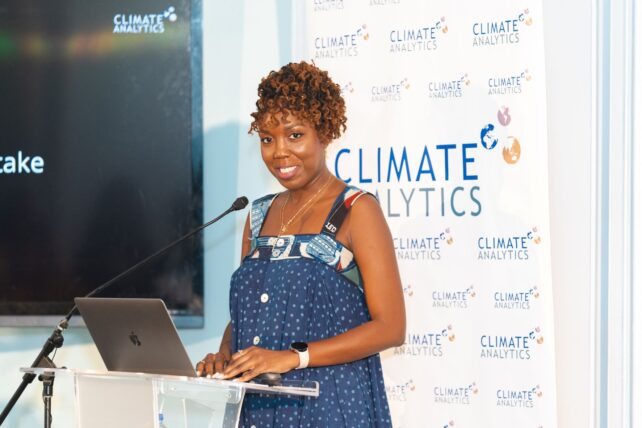
This year’s seminal UN climate change summit, COP27, delivered critical decisions aimed at combating the global climate crisis, and Climate Analytics Caribbean’s team of policy experts was closely involved in the proceedings. After spending three weeks at the summit in Sharm El Sheikh, Egypt, Climate Analytics Caribbean held a COP27 Review on Wednesday, December 14, in Port of Spain, to engage the public and raise awareness of the outcomes which will have considerable impact on our islands.
Key on the agenda were insights on the agreements struck on the thematic areas of mitigation, adaptation, the global stocktake. At our world’s present level of warming of 1.1°C above pre-industrial levels, islands are already suffering from significant losses and damage such as the recent devastating flash flooding in St. Lucia and Trinidad and Tobago. COP27 saw countries commit to work programmes to ramp up ambition and implementation on mitigation and a just transition. Climate Analytics Caribbean warned that countries need to urgently scale up ambition and implementation in these areas in order to avoid the most catastrophic impacts of climate change, which would render many islands and low-lying territories unlivable.
Presenters also expounded on the big win for the Caribbean region and all small island developing States – the establishment of a loss and damage response fund, which will assist vulnerable countries to cope with devastating climate impacts– from loss of homes and livelihoods due to slow-onset events such as coastal erosion, to damage resulting from severe storms. This was a long-fought battle for the global south, as many negotiators in the United Nations Framework Convention on Climate Change (UNFCCC) process conveyed their skepticism throughout the year that bigger countries would agree to the fund.
Speaking on behalf of the Honourable Pennelope Beckles, Minister of Planning and Development at the event was Mr. Kishan Kumarsingh, Head of the Multilateral Environmental Agreements Unit of the Ministry of Planning and Development. Mr. Kumarsingh described the establishment of the loss and damage fund as a major milestone.
“After thirty years of dogged advocacy and meticulous building, Parties finally agreed to the establishment of a loss and damage response fund,” said Kumarsingh. “While Trinidad and Tobago welcomes the much-needed establishment of a finance facility, we recognise that no amount of money can recompense communities that have suffered the irreparable losses of their territories, cultures and traditions. We are therefore keen on engaging constructively in the design of the funding arrangements.”
Kumarsingh also noted the initiatives taken by the Ministry of Planning and Development to improve mitigation ambition and increase resiliency, and lauded the landmark agreement signed in December for the installation of a 112-megawatt solar utility-scale plant in Trinidad and Tobago, which will be among the largest such plants in the Caribbean.
The Climate Analytics Caribbean team is led by Director, Rueanna Haynes, a long-standing adviser to the Alliance of Small Island Developing States (AOSIS) negotiating bloc.
“We must make substantive progress on climate action – for us in the Caribbean this is the only way we can secure our societies and livelihoods and safeguard our heritage for future generations. The likelihood of becoming climate refugees is a fate that hangs over us, our children, and children’s children, if we do not accelerate climate action now,” said Haynes. “While COP27 delivered for our islands with the loss and damage fund, and we are indeed moving the dial closer to achieving a robust global response to climate change – we still have a long way to go. And the repercussions of inaction will be disastrous.”
“This is the critical decade for the climate. Our world is grappling with increasing emissions globally, in particular from the major emitters in the Group of 20 countries. It is imperative that we continue to put pressure on all Parties to go beyond pledges and actually implement the hard-fought agreements secured at COP27. As we have seen with the achievement of the loss and damage response fund, our islands are strong together, we are capable of making tremendous moves. Climate Analytics Caribbean is proud to serve our region and looks forward to contributing to a new era of transformative Caribbean climate action.”


The valley in the North of England where I spent my childhood on occasions had snow falls in May and the same valley could be freezing cold by September. Yet in the 16th century it was a grape growing region.
Likewise, land masses in Greenland that are now covered in ice once supported farms.
In the Caribbean, rainfall and temperatures have always fluctuated and they always will. The difference now being that there is money to be made from perceived climate change.